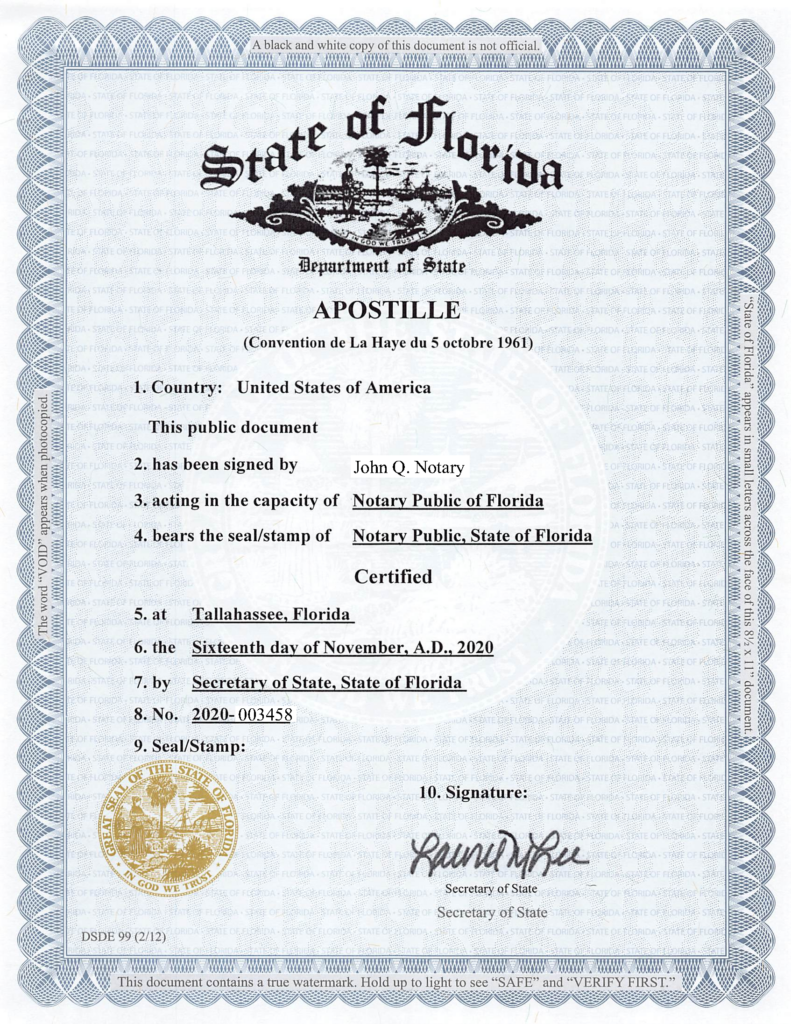Exploring the Factors Behind the Necessary Requirement of Apostille Qualification for Legal Papers
In the world of legal documentation, the compulsory need of apostille certification has actually ended up being an important aspect that substantially impacts the validity and acknowledgment of lawful papers on a global scale. Understanding the reasoning behind this need entails diving into the detailed internet of legal complexities, historic criteria, and global contracts that emphasize the value of apostille qualification in today's interconnected globe. By discovering the underlying reasons behind this widespread demand, a clearer photo emerges of why this seemingly governmental process holds such enormous significance for organizations, individuals, and federal governments alike.
Historical Advancement of Apostille Certification
Just how did the principle of apostille qualification progress over time to become a necessary part of international file validation? The requirement for a simplified method of verifying records for use across boundaries came to be apparent as international profession and travel raised.
At first taken on by a few European countries, the Apostille Convention gradually obtained international acceptance as a result of its effectiveness and efficiency in verifying the authenticity of main papers. Over the years, the convention's reach broadened as even more nations joined, acknowledging the apostille as a globally accepted type of record verification. Today, apostille certification has actually ended up being a conventional demand for verifying legal papers in global transactions, guaranteeing smooth interaction and lawful proceedings between nations.
Simplifying International File Legalisation
The streamlining of worldwide file legalization procedures has actually significantly boosted efficiency in cross-border transactions. Streamlining the procedure of legislating papers for international use has come to be important in helping with swift and smooth transactions in between nations. Among the vital systems that have added to this simplification is the adoption of the Apostille Convention, which gives a standardized method for verifying the authenticity of documents throughout taking part nations.
By sticking to the Apostille needs, nations agree to identify each various other's public files as valid without the need for further legalization. This gets rid of the extensive and commonly difficult procedure of several authentications by various authorities, saving time and resources for organizations and people participated in international tasks.

Guaranteeing Paper Credibility and Validity
To make certain the credibility and validity of lawful files in global transactions, rigorous confirmation procedures are crucial. By needing apostille certification for lawful documents, authorities aim to verify the beginning of records and confirm the trademarks of people entailed.
Additionally, verifying the credibility of legal files with apostille qualification improves count on and confidence amongst events engaging in worldwide deals. Eventually, by supporting stringent verification standards, apostille qualification contributes to an extra safe and secure and transparent worldwide lawful structure.

Promoting Cross-Border Legal Recognition
In the realm of global purchases, the apostille accreditation not just makes certain the authenticity and credibility of lawful records however likewise plays a critical duty in promoting cross-border lawful recognition (Houston Apostille). When legal papers birth an apostille certification, they are conveniently approved by foreign authorities without the demand for more verification. This structured process speeds up the acknowledgment of files in different countries, informative post advertising efficiency and minimizing bureaucratic obstacles in legal matters that go beyond nationwide borders
Helping with cross-border legal recognition via apostille qualification promotes trust and self-confidence in the authenticity of files exchanged between nations. By sticking to the criteria established forth by the Apostille Convention, nations agree to honor the apostille seals fastened to records from various other more tips here member nations, therefore simplifying the procedure of legal acknowledgment across boundaries.
Compliance With International Treaty Requirements
Conformity with international treaty criteria is necessary for making sure the uniform application of legal policies across taking part nations. The Apostille Convention, established in 1961, lays out the needs for the acceptance of public records among participant nations.
The Apostille certification, as mandated by the treaty, acts as a guarantee of credibility for documents such as birth certifications, marriage licenses, court judgments, and notarized actions. This standard strategy helps avoid fraud and makes certain that lawful papers originating from one participant nation are easily accepted in one more. Additionally, by adhering to international treaty requirements, countries show their commitment to maintaining the concepts of openness, trust, and participation in lawful issues on a worldwide scale.
Verdict

In the world of lawful documents, the compulsory demand of apostille accreditation has become an essential aspect that substantially impacts the credibility and acknowledgment of legal documents on an international range. Today, apostille certification has ended up being a conventional need for validating lawful papers in global deals, ensuring smooth communication and legal process in between countries.
Moreover, confirming the authenticity of legal files via apostille accreditation boosts depend on and confidence among events engaging in global deals.In the world of global purchases, the apostille accreditation not only makes sure the credibility and credibility of lawful documents yet also plays a critical role in facilitating cross-border lawful acknowledgment. By sticking to the standards set forth by the Apostille Convention, nations agree to honor the apostille seals attached to documents from various other member countries, hence streamlining the process of lawful acknowledgment throughout boundaries.